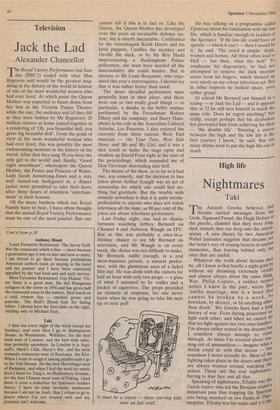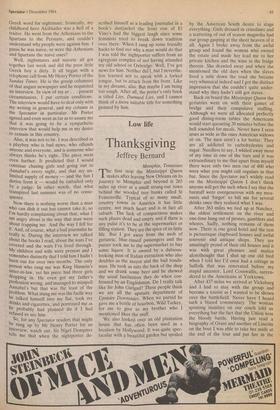High life
Nightmares
Taki
The Ancient Greeks believed that dreams carried messages from the Gods. Sigmund Freud, the Hugh Hefner of the psyche, claimed that they were long' dark tunnels that ran deep into the uncon- scious. A new theory by two American Nobel laureates suggests that dreams are the brain's way of erasing bizarre or useless memories, thus leaving behind only the ones that are useful.
Whatever the truth about dreams may be, all I know is that hardly a night goes by without my dreaming extremely vividly and almost always about the same thing. War. Philip Caputo, a soldier turned writer I knew in the past, wrote that `unlike marriage, war is a bond that cannot be broken by a word, by boredom, by divorce, or by anything other than death.' We Greeks have had a long history of war. Even during peacetime we fight each other, and when we cannot do that we fight against our very own families' I'm always rather scared in my dreams but I somehow always manage to come through. At times I'm worried about run- ning out of ammunition — imagine what a shrink could do with that dream — but somehow I never actually do. Most of the fighting takes place in the desert and there arc always women around watching the action. Those are the real nightmares' having to lose face and all that. Speaking of nightmares, Efialtis was the Greek traitor who led the Persians round a mountain pass thus trapping the Spartans into being attacked on two flanks in Ther- mopylae. Efialtis was his name and it is the
Greek word for nightmare. Ironically, my childhood hero Alcibiades was a hell of a traitor. He went from the Athenians to the Spartans to the Persians, and couldn't understand why people were against him. I guess he was naive, or were the Athenians and Spartans the naive ones?
Well, nightmares and naivete all got together last week and did the poor little Greek boy a dirty. It all began with a telephone call from Mr Henry Porter of the Sunday Times. He is the gossip columnist of that august newspaper and he requested an interview. In view of my er . . . present circumstances, I put certain conditions. The interview would have to deal only with my writing in general, and my column in the Spectator in particular. Mr Porter agreed and even went as far as to assure me that it was going to be a sympathetic interview that would help me in my desire to remain in this country.
Alas, it was not to be. I was described as a playboy who is bad news, who offends anyone and everyone, and is someone who always thinks he's, right. The piece went even further. It predicted that I would co'ntinue chasing girls and going out to Annabel's every night, and that my un- limited supply of money — and the fun I derive from it — would be curtailed only by a judge. In other words, that what transpired last summer was of no conse- quence.
Now there is nothing worse than a man who can dish it out but cannot take it, so I'm hardly complaining about that, what I am angry about is the way that man went about trapping me. And the way I fell for it. And, of course, what a bad journalist he really is. During the interview we talked about the books I read, about the wars I've covered and the wars I've lived through. MY children and wife were present and I remember distinctly that I told him I hadn't been out for over two months. The only Person who rang me was King Hussein's sister-in-law, yet his piece had three girls dropping in. He even got my father's profession wrong, and managed to misspell Annabel's but that was the least of the Problem. What stung me was the facile way he talked himself into my flat, took my drinks and cigarettes, and portrayed me as he probably had planned do if I had refused to see him.
So, for any Spectator readers that might be rung up by Mr Henry Porter for an interview, watch out. Sir Nigel Dempster tells me that when the nightporter de- scribed himself as a leading journalist in a book's dustjacket the front row of El Vino's had the biggest laugh since some feminists tried to break down tradition over there. When I rang up some friendly hacks to find out why a man would do that I was told the nightporter suffers from an egregious complex of not having attended my old school or Oxbridge. Well, I've got news for him. Neither did I, but I neverthe- less learned not to speak with a forked tongue, but to attack from the front. Like in my dreams, alas. But maybe I am being too tough. After all, the porter's only book is titled Lies, Damned Lies, and I cannot think of a more suitable title for something penned by him.























































 Previous page
Previous page